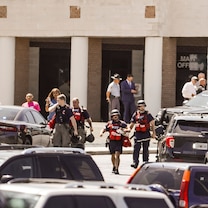Watchdogs ask judge to remove from Utah ballots a measure that would boost lawmakers' power
Government watchdog groups are asking a judge to remove from the Utah ballot a measure that would give lawmakers more power over citizen initiatives
Government watchdog groups in Utah are asking a judge to remove from November's ballot a measure that would bolster lawmakers' power.
The question would amend the state constitution to allow lawmakers to change citizen-initiated ballot measures after they have passed. It would also give citizen initiative efforts more time to gather signatures and bar foreign influence on ballot measures.
The legal filing is the latest episode in a long-running tug-of-war over control of the legislative and congressional maps but could have implications for other areas covered by citizen-initiated ballot measures, too. The issue is a glimpse into a pattern of state lawmakers trying to subvert the will of voters when it comes to control of political maps.
The League of Women Voters, Mormon Women for Ethical Government and other plaintiffs in a long-running lawsuit say lawmakers changed election deadlines to rush to the ballot a measure to undermine the say of voters. They also say the language that voters will see on ballots does not describe what the measure would do.
“Instead, it seeks through deception to mislead Utah voters into surrendering their constitutional rights,” they say in the legal filing, The plaintiffs, represented by the Campaign Legal Center, say that the ballot language makes it sound like the measure is protecting voters' rights but doesn't mention where it would roll them back.
“The text of the Amendment — in sweeping language — wholesale exempts the Legislature from complying with any constitutional provision when it acts to amend, repeal, or enact laws in relation to voter-approved initiatives,” the filing says.
The groups are calling on a federal court to remove the measure from the ballot quickly, as ballots are to be sent to overseas and miliary voters starting Sept. 20.
This part of the legal dispute was years in the making. In 2018, voters approved a ballot measure that created an independent commission to draw legislative districts every decade. The commission would send its recommendation to the Legislature, which could approve those maps or redraw them. The measure also barred drawing districts lines to protect incumbents or favor a political party, a practice known as gerrymandering. Lawmakers removed that provision in 2020.
And lawmakers ended up ignoring the commission's congressional map and passing its own, splitting relatively liberal Salt Lake City into four districts — each of which is now represented by a Republican.
In July, the Utah Supreme Court — with all five of its justices appointed by Republicans — ruled that the GOP had overstepped its bounds by undoing the ban on political gerrymandering.
Lawmakers responded by holding a special session in August to add a measure to November's ballot to ask voters to grant them a power that the state's top court held they did not have.
In a join statement Friday, state Senate President J. Stuart Adams and Speaker Mike Schultz defended the measure.
“It’s ironic that the very people who claim to advocate for greater voter engagement are the same ones trying to obstruct Utahns from having the opportunity to vote on this important matter," they said. "The plaintiffs are clearly concerned about leaving it to voters to decide. Before initiatives overwhelm and significantly alter our state, Utahns should have the opportunity to voice their opinions.”
Changes to the political mapmaking process have been the impetus for attempts to change the state constitution in other states, too.
Missouri voters approved a redistricting process in 2018 intended to create “partisan fairness” in voting districts. Lawmakers promptly placed a new amendment on the ballot to undo some of the key elements, and voters agreed to the new version in 2020.
In 2022, Arizona lawmakers placed on the ballot a proposal that would allow them to amend or repeal entire voter-approved measures if any portion of them is found unconstitutional or illegal by the state or federal Supreme Court. Voters defeated it.
This year, an advocacy group has won a spot on the ballot in Ohio for a measure that would appoint a new commission to draw legislative and congressional maps. State Attorney General Dave Yost, a Republican, objected twice to the ballot measure language.




